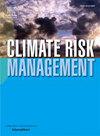Impact of current and historical climate shocks on crop diversification in Zambia: Insights from household- and district-level observations
IF 5
2区 环境科学与生态学
Q1 ENVIRONMENTAL SCIENCES
引用次数: 0
Abstract
Crop diversification is a farming practice for risk management prevalent in smallholder agriculture, offering adaptive benefits against challenges like climate change, price fluctuations, and crop disease. Despite its importance, there is a lack of comprehensive understanding of the relationship of crop diversification and current and historical climate shock. Our study seeks to bridge this gap through statistical analysis of household- and district-level data in Zambia. Specifically, we use the Pooled Fractional Probit (PFP) estimator to develop regression models for crop diversification, analyzing 6625 households for 3 years and 74 districts for 9 years, using Rural Agriculture Living Survey (RALS) and Crop Forecast Survey (CFS) datasets, respectively. Simpson’s Diversity Index (SDI) of crops serves as the dependent variable and is consistently higher at the district level than at the household level, suggesting that aggregation at larger scales may mask localized monoculture vulnerabilities. Our findings reveal that both current and historical climate shocks significantly influence crop diversification decisions at both the household and district levels in Zambia. Heat stress and rainfall deficits during the planting season promote crop diversification, but their effects vary due to the diverse agroecological conditions and crop characteristics in different areas. Historical climate shocks prompt farmers to diversify as a long-term resilience strategy. This study emphasizes the complex, scale-dependent drivers of crop diversification in response to climate shocks, providing valuable insights for policy development in climate-resilient agricultural strategies.
当前和历史气候冲击对赞比亚作物多样化的影响:来自家庭和地区层面观察的见解
作物多样化是小农农业中普遍存在的一种风险管理耕作方式,可为应对气候变化、价格波动和作物病害等挑战提供适应性效益。尽管它很重要,但对作物多样化与当前和历史气候冲击的关系缺乏全面的了解。我们的研究试图通过对赞比亚家庭和地区一级数据的统计分析来弥合这一差距。具体而言,我们使用PFP (Pooled Fractional Probit)估计器建立了作物多样化的回归模型,分别使用农村农业生活调查(RALS)和作物预测调查(CFS)数据集分析了6625户3年和74个地区9年的数据集。作物的辛普森多样性指数(SDI)作为因变量,在地区水平上始终高于家庭水平,这表明更大规模的聚集可能掩盖了局部单一栽培的脆弱性。我们的研究结果表明,当前和历史的气候冲击显著影响了赞比亚家庭和地区层面的作物多样化决策。种植季节的热胁迫和降雨不足促进了作物的多样化,但其效果因不同地区农业生态条件和作物特性的差异而有所不同。历史上的气候冲击促使农民将多样化作为长期抵御力战略。本研究强调了应对气候冲击的作物多样化的复杂、规模依赖性驱动因素,为气候适应型农业战略的政策制定提供了有价值的见解。
本文章由计算机程序翻译,如有差异,请以英文原文为准。
求助全文
约1分钟内获得全文
求助全文
来源期刊

Climate Risk Management
Earth and Planetary Sciences-Atmospheric Science
CiteScore
8.20
自引率
4.50%
发文量
76
审稿时长
30 weeks
期刊介绍:
Climate Risk Management publishes original scientific contributions, state-of-the-art reviews and reports of practical experience on the use of knowledge and information regarding the consequences of climate variability and climate change in decision and policy making on climate change responses from the near- to long-term.
The concept of climate risk management refers to activities and methods that are used by individuals, organizations, and institutions to facilitate climate-resilient decision-making. Its objective is to promote sustainable development by maximizing the beneficial impacts of climate change responses and minimizing negative impacts across the full spectrum of geographies and sectors that are potentially affected by the changing climate.
 求助内容:
求助内容: 应助结果提醒方式:
应助结果提醒方式:


